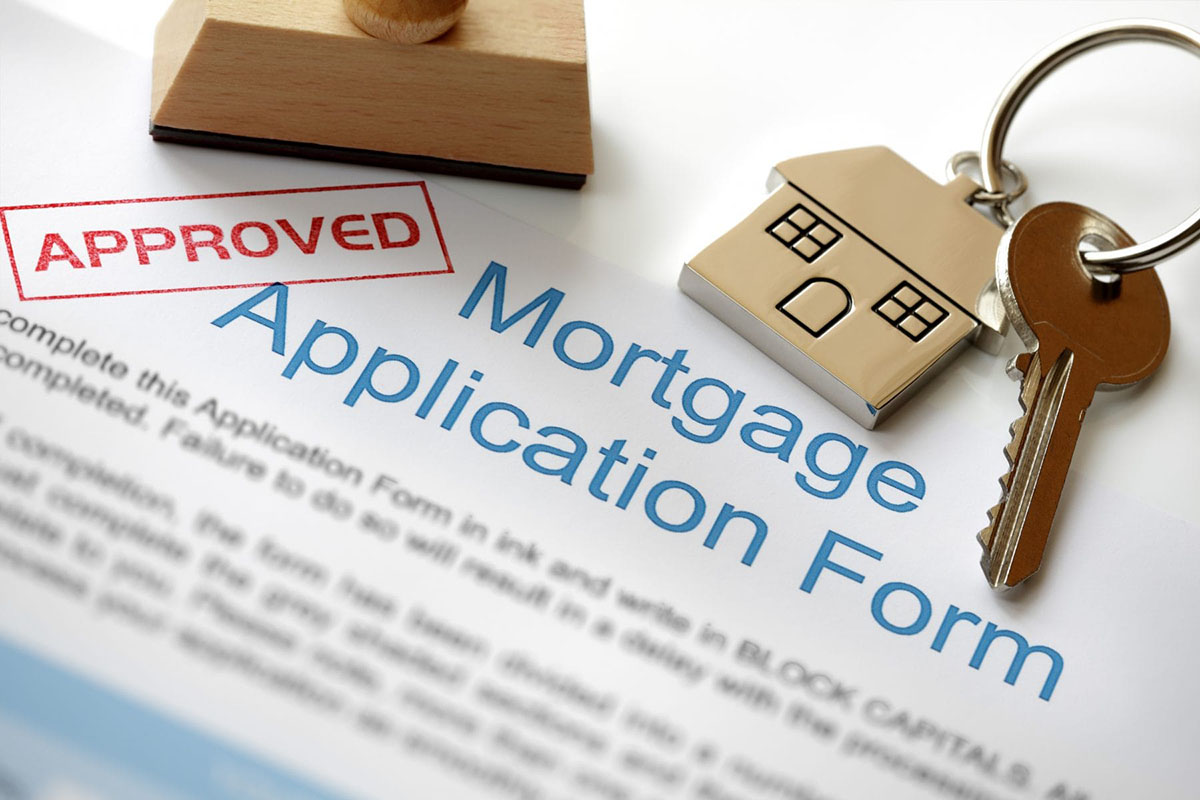Home>Finance>What Happens If My Mortgage Loan Not Approved Before Closing Date


Finance
What Happens If My Mortgage Loan Not Approved Before Closing Date
Modified: December 30, 2023
If your mortgage loan is not approved before the closing date, you may face financial consequences. Stay updated on finance options to ensure a smooth homebuying process.
(Many of the links in this article redirect to a specific reviewed product. Your purchase of these products through affiliate links helps to generate commission for LiveWell, at no extra cost. Learn more)
Table of Contents
- Introduction
- Understanding the Mortgage Loan Approval Process
- Possible Reasons for Mortgage Loan Not Being Approved
- Consequences of Mortgage Loan Not Being Approved Before Closing Date
- Options for Homebuyers if Mortgage Loan is Not Approved
- Steps to Take if Mortgage Loan is Not Approved Before Closing Date
- Conclusion
Introduction
Welcome to the exciting journey of purchasing a new home! As you navigate through the process of buying a house, one critical milestone is the approval of your mortgage loan. This approval signifies that the lender has assessed your financial eligibility and has confidence in your ability to repay the loan.
However, there might be instances where your mortgage loan is not approved before the scheduled closing date. This can be a stressful and disappointing situation for any homebuyer. But fret not! In this article, we will explore what happens if your mortgage loan is not approved before the closing date and discuss the potential reasons behind it.
It is essential to note that the information provided here is general in nature and may vary based on your specific circumstances and location. It is always best to seek advice from a qualified mortgage professional for tailored guidance.
Understanding the Mortgage Loan Approval Process
Before diving into the possible consequences of a mortgage loan not being approved before the closing date, let’s first understand the mortgage loan approval process.
When you apply for a mortgage, the lender evaluates various factors to determine your eligibility and calculate the amount they are willing to lend you. These factors typically include your credit score, income, employment history, debt-to-income ratio, down payment, and property appraisal. The lender carefully analyzes these elements to assess the risk associated with granting you a loan.
Once you have submitted all the required documentation, the lender reviews your application, verifies the information, and conducts a thorough underwriting process. This involves assessing your financial stability, employment status, credit history, and the property’s value. The underwriter meticulously evaluates the details of your application to ensure compliance with the lender’s guidelines and industry standards.
If your application meets the lender’s criteria and passes the underwriting process, your mortgage loan is approved. At this point, you are ready to move forward with the closing process, sign the necessary paperwork, and officially become a homeowner. However, if the approval process encounters any roadblocks, your loan may not be approved before the closing date.
Understanding the Mortgage Loan Approval Process
Before diving into the possible consequences of a mortgage loan not being approved before the closing date, let’s first understand the mortgage loan approval process.
When you apply for a mortgage, the lender evaluates various factors to determine your eligibility and calculate the amount they are willing to lend you. These factors typically include your credit score, income, employment history, debt-to-income ratio, down payment, and property appraisal. The lender carefully analyzes these elements to assess the risk associated with granting you a loan.
Once you have submitted all the required documentation, the lender reviews your application, verifies the information, and conducts a thorough underwriting process. This involves assessing your financial stability, employment status, credit history, and the property’s value. The underwriter meticulously evaluates the details of your application to ensure compliance with the lender’s guidelines and industry standards.
If your application meets the lender’s criteria and passes the underwriting process, your mortgage loan is approved. At this point, you are ready to move forward with the closing process, sign the necessary paperwork, and officially become a homeowner. However, if the approval process encounters any roadblocks, your loan may not be approved before the closing date.
There are several factors that can influence the approval process, including:
- Credit score: Lenders consider your credit score as a measure of your creditworthiness. A low credit score can raise concerns and make it challenging to secure loan approval.
- Income and employment history: Lenders assess your income stability and employment history to determine your ability to make mortgage payments consistently.
- Debt-to-income ratio: Lenders evaluate your debt-to-income ratio, which compares your monthly debt payments to your monthly income. A high ratio can indicate a higher risk for the lender.
- Down payment: The amount of money you are contributing as a down payment can impact the loan approval process. A larger down payment generally demonstrates financial stability and reduces the lender’s risk.
- Property appraisal: The lender will conduct an appraisal on the property to ensure its value aligns with the loan amount. If the appraisal comes in lower than expected, it can affect the loan approval decision.
Keep in mind that every lender has specific criteria and guidelines, so the approval process may vary depending on the lending institution. It’s crucial to work closely with your mortgage lender and provide all the necessary documentation in a timely manner to expedite the approval process.
In the next section, we will explore the potential reasons why your mortgage loan may not be approved before the scheduled closing date.
Possible Reasons for Mortgage Loan Not Being Approved
While it’s disheartening to learn that your mortgage loan may not be approved before the closing date, understanding the potential reasons behind it can help provide clarity and guide your next steps. Here are some common factors that could contribute to a loan not being approved:
1. Credit issues: One of the primary reasons for loan denial is credit-related problems. If you have a low credit score, a history of late payments, or significant outstanding debts, lenders may have concerns about your ability to repay the loan on time. It’s crucial to maintain a healthy credit history and address any credit issues before applying for a mortgage.
2. Insufficient income: Lenders need assurance that you have a stable income and sufficient funds to cover your monthly mortgage payments. If your income is irregular, insufficient, or doesn’t meet the lender’s requirements, it can lead to loan denial. It’s essential to demonstrate consistent income over a sustained period and ensure that it aligns with the lender’s income requirements.
3. High debt-to-income ratio: Your debt-to-income ratio (DTI) compares your monthly debt obligations to your monthly income. If your DTI is too high, it indicates that a significant portion of your income is already allocated to debt payments. Lenders prefer borrowers with a lower DTI ratio as it signifies a lower risk of default. Keeping your debt levels in check and minimizing new debts can improve your chances of loan approval.
4. Unsatisfactory property appraisal: The appraisal of the property is an essential part of the mortgage approval process. If the appraised value of the property comes in lower than the purchase price or doesn’t meet the lender’s requirements, it can lead to loan denial. Lenders want to ensure that the property is sufficient collateral for the loan amount.
5. Inadequate documentation: Providing accurate and complete documentation is crucial during the mortgage application process. Failure to submit all the required paperwork or providing incomplete or misleading information can lead to loan denial. Make sure to review the lender’s documentation checklist and submit all requested documents promptly.
6. Change in financial circumstances: If your financial circumstances have changed significantly since you initially applied for the loan, it can impact the approval process. This includes changes in employment, income, or credit standing. Lenders may reevaluate your application based on the updated information and may require additional documentation or deny the loan altogether.
It’s important to remember that each lender has its own set of criteria and guidelines, so the specific reasons for loan denial may vary. If your loan is not approved before the closing date, don’t panic. There are several options and steps you can take to address the situation, which we will explore in the next section.
Consequences of Mortgage Loan Not Being Approved Before Closing Date
When a mortgage loan is not approved before the scheduled closing date, it can have various consequences for both the homebuyer and the seller. Let’s explore some of the potential repercussions:
1. Delayed or canceled home purchase: The most immediate consequence of a loan not being approved is the potential delay or cancellation of the home purchase. Without the funds from the mortgage loan, you may be unable to proceed with the closing process and finalize the purchase of the property. This can be particularly frustrating if you have already made arrangements for moving or have started the process of selling your current home.
2. Financial implications: If the mortgage loan is not approved, you might find yourself facing significant financial implications. You may lose any upfront costs paid, such as appraisal fees or inspection fees. Additionally, you may encounter additional costs related to extending lease agreements on your current residence or storage fees for belongings if you were planning to move.
3. Contractual obligations: When you enter into a purchase agreement for a property, there are typically contractual obligations that you must fulfill. If your mortgage loan is not approved, you may be in breach of these obligations, which could result in legal consequences or financial penalties.
4. Effects on the seller: A failed mortgage loan approval can also impact the seller of the property. They may have to put their plans on hold, find a new buyer, or potentially even relist the property. This can be a frustrating and time-consuming process for the seller, leading to potential financial loss or inconvenience.
5. Impact on credit: Applying for a mortgage involves a credit inquiry, which can have a temporary impact on your credit score. If your loan is not approved and you need to reapply with another lender, it could result in multiple credit inquiries and further affect your credit score. It’s essential to manage this situation carefully to minimize any negative impacts on your credit.
6. Emotional stress and disappointment: Being informed that your mortgage loan is not approved can be emotionally challenging. It can create stress, disappointment, and uncertainty about your future homeownership plans. It’s crucial to take care of your mental well-being during this time and seek support from professionals or loved ones.
It’s important to note that the consequences mentioned above are potential outcomes and may vary depending on individual circumstances and agreements. If your mortgage loan is not approved before the closing date, it’s essential to explore your options and take steps to address the situation. In the next section, we will discuss some possible options for homebuyers in this scenario.
Options for Homebuyers if Mortgage Loan is Not Approved
Discovering that your mortgage loan is not approved before the closing date can be disappointing, but it doesn’t necessarily mean the end of your homeownership dreams. Here are some potential options to consider if you find yourself in this situation:
1. Discuss with your lender: Reach out to your lender to understand the reasons behind the loan denial. They can provide insights into specific issues that need to be addressed or suggest alternative loan programs that might be more suitable for your circumstances. There could be additional documentation or steps you can take to make your application more appealing to lenders.
2. Work on credit improvement: If your credit score was a factor in the loan denial, take steps to improve your creditworthiness. Pay off outstanding debts, correct any errors on your credit report, and establish a history of on-time payments. This may require some time and effort, but it can significantly increase your chances of loan approval in the future.
3. Explore alternative financing options: If your current lender is unable to approve your loan, consider seeking alternative financing options. This could involve approaching other lenders who may have more flexible lending criteria or exploring government-backed loan programs, such as FHA loans or VA loans. These programs often have less stringent requirements and can be more accessible for certain borrowers.
4. Reevaluate your budget and down payment: Assess your budget and determine if you can increase your down payment or adjust your homebuying expectations. A larger down payment can reduce the loan amount, making it more manageable for lenders. Moreover, revisiting your budget can help identify areas where you can save more or reduce expenses, improving your financial standing for future loan applications.
5. Consider a co-signer or joint application: If your loan denial is primarily due to income or credit-related reasons, you can explore the possibility of having a co-signer or applying for the loan jointly with a financially stable and creditworthy individual. Their strong financial profile can strengthen your loan application and increase your chances of approval.
6. Take a step back and reevaluate: If all immediate options seem unattainable or the timing is not right, it might be worth taking a step back and reevaluating your homeownership plans. This could involve saving more money for a larger down payment, further improving your credit, or reassessing your financial goals. Delaying your home purchase can allow you to better prepare and increase your chances of securing a loan in the future.
Remember to consult with a mortgage professional who can provide personalized guidance based on your specific situation. They can help you navigate through the available options and determine the best course of action.
In the next section, we will discuss the steps to take if your mortgage loan is not approved before the closing date to ensure a smooth and informed decision-making process.
Steps to Take if Mortgage Loan is Not Approved Before Closing Date
Discovering that your mortgage loan is not approved before the scheduled closing date can be a challenging situation to navigate. To ensure a smooth process and explore your options effectively, consider taking the following steps:
1. Communicate with the parties involved: Inform all involved parties, including your real estate agent, seller, and attorney, about the loan denial. Clear and open communication is crucial to manage expectations and discuss potential next steps.
2. Understand the reasons: Work closely with your lender to understand the specific reasons for the loan denial. This will provide insights into areas that need improvement or clarification. By understanding the underlying issues, you can take the necessary steps to address them for future loan applications.
3. Review the purchase agreement and contingencies: Carefully review the terms and conditions outlined in the purchase agreement. Pay particular attention to any contingency clauses that allow for the termination or extension of the agreement due to financing issues. Understanding these provisions will help you determine the appropriate course of action within the legal framework.
4. Explore alternative financing options: Consult with other lenders or mortgage professionals to explore alternative financing options. They may have different loan programs or more flexible requirements that can accommodate your situation. Be prepared to provide all necessary documentation and be proactive in seeking out potential solutions.
5. Negotiate an extension: If you believe there is a possibility of securing the loan in the near future, you can negotiate for an extension of the closing date with the seller. This will allow additional time to resolve the financing issues and proceed with the purchase. Keep in mind that the seller must agree to the extension, and it’s crucial to have open and transparent communication during negotiations.
6. Consider seeking legal advice: If you encounter difficulties or disputes related to the loan denial or the purchase agreement, it may be beneficial to consult with a real estate attorney. They can provide guidance on your rights, contractual obligations, and potential legal recourse.
7. Reevaluate your financial situation: Take the time to reassess your financial situation, including your credit, income, and debt obligations. Address any issues that contributed to the loan denial and work towards improving your financial standing. This might involve paying off outstanding debts, increasing your credit score, or seeking financial advice to strengthen your overall financial health.
8. Continue searching for other properties: While you navigate through the loan denial situation, it’s advisable to continue your search for other potential properties. This ensures that you have backup options if the current purchase falls through. It’s essential to remain vigilant and explore different market opportunities.
Remember, each situation is unique, and the appropriate steps to take may vary. Seeking advice from professionals, such as mortgage lenders, real estate agents, and attorneys, can provide you with the guidance necessary to make informed decisions.
In the concluding section, we will summarize the key points discussed in this article.
Conclusion
While it can be disappointing to discover that your mortgage loan is not approved before the closing date, it’s important to remember that this setback doesn’t have to be the end of your homeownership dreams. By understanding the mortgage loan approval process, potential reasons for loan denial, and the available options, you can navigate this situation with confidence and explore alternative paths to homeownership.
If your loan is not approved, take proactive steps to address the underlying issues. Work closely with your lender to understand the reasons for the denial and explore options for credit improvement or alternative financing. Open communication with all parties involved, including the seller and real estate agent, is essential to manage expectations and discuss potential alternatives.
Consider seeking professional guidance from mortgage professionals, real estate attorneys, and credit counselors who can provide tailored advice based on your specific situation. They can help you explore alternative financing options, negotiate extensions if necessary, and offer valuable insights to navigate any legal or contractual obligations.
Remember that setbacks are often opportunities for growth and learning. Take this opportunity to reassess your financial situation, work on credit improvement, and make any necessary adjustments to increase your chances of approval in the future. It’s also important to exercise patience and perseverance as you continue your homeownership journey.
Lastly, don’t forget to take care of your emotional well-being throughout this process. Purchasing a home is an emotional and exciting endeavor, and setbacks can be frustrating. Seek support from loved ones, remain positive, and stay committed to achieving your homeownership goals.
In summary, if your mortgage loan is not approved before the closing date, it’s not the end of the road. By understanding the reasons for denial, exploring alternative financing options, and taking the necessary steps to address any underlying issues, you can overcome this obstacle and continue moving forward towards fulfilling your dream of homeownership.














